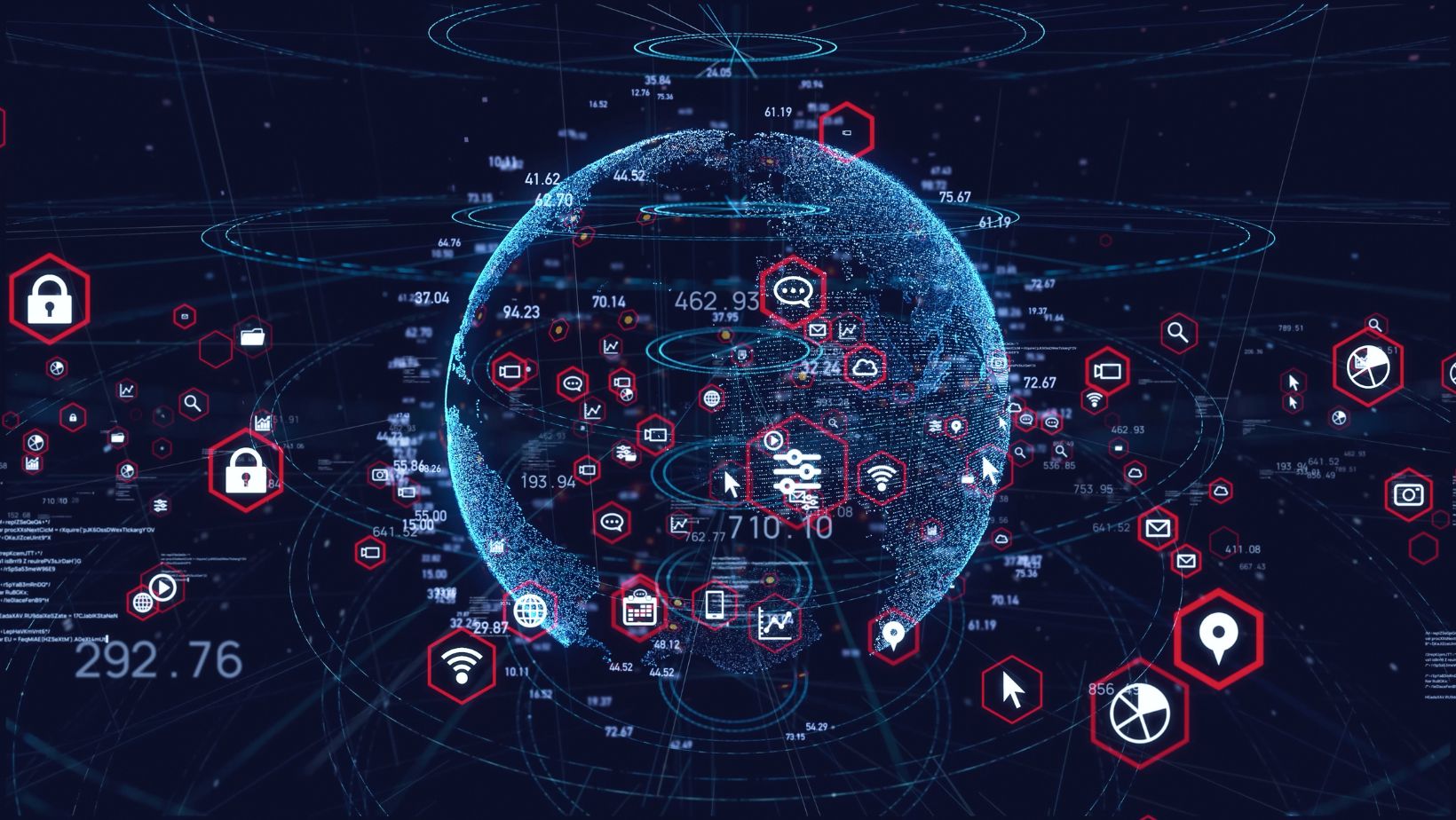Key Takeaways
-
- Digital technology innovation is essential for staying competitive in today’s fast-paced landscape, encompassing advancements like AI, blockchain, IoT, and cloud computing.
-
- AI and machine learning enhance decision-making and operational efficiency across various industries, providing predictive analytics and personalized services.
-
- Blockchain technology improves transaction security and transparency, enabling trust and minimizing fraud through decentralized systems.
-
- The Internet of Things (IoT) connects devices for real-time data exchange, optimizing operations and enhancing customer experiences across sectors.
-
- Organizations must navigate challenges such as cybersecurity risks and ethical implications while implementing digital innovations to maximize benefits.
-
- Future trends in digital technology include AI augmentation, decentralized finance, enhanced 5G connectivity, and a focus on ethical technology, shaping the next wave of innovation.
In today’s fast-paced world,
digital technology innovation is reshaping industries and transforming lives. From artificial intelligence to blockchain, these advancements are not just trends; they’re the backbone of modern progress. Businesses and individuals alike must adapt to this ever-evolving landscape to stay relevant and competitive.
As digital technology continues to advance, it opens doors to new opportunities and challenges. Companies are leveraging innovative tools to enhance efficiency, improve customer experiences, and drive growth. Understanding these innovations is crucial for anyone looking to navigate the complexities of the digital age and harness its potential.
Digital Technology Innovation
Digital technology innovation refers to the creation and implementation of new technologies that transform how businesses operate and individuals interact. Key advancements include artificial intelligence (AI), blockchain, the Internet of Things (IoT), and cloud computing. Each technology contributes uniquely to efficiency and productivity.
-
- Artificial Intelligence: AI automates processes, enhances data analysis, and improves decision-making. Industry applications span healthcare, finance, and manufacturing, showcasing its versatility.
-
- Blockchain: Blockchain enhances security and transparency in transactions. Its decentralized nature revolutionizes supply chains, contracts, and digital currencies, enabling trust without intermediaries.
-
- Internet of Things: IoT interconnects devices, allowing for real-time data collection and analysis. Smart homes and industrial systems leverage IoT, optimizing operations and resource management.
-
- Cloud Computing: Cloud services provide scalable resources and storage solutions. Businesses benefit from reduced costs and increased flexibility, accessing data and applications from anywhere.
The rapid pace of digital technology innovation poses both opportunities and challenges. Adapting to these developments is essential for competitive advantage. Organizations that leverage these technologies effectively can streamline operations and enhance customer experiences, maintaining relevance in a fast-evolving digital landscape. Understanding these innovations equips individuals and businesses to navigate the complexities of the digital age successfully.
Key Areas of Innovation

Digital technology innovation drives significant advancements in various sectors. The following key areas represent crucial elements of this transformation.
Artificial Intelligence and Machine Learning
Artificial Intelligence (AI) and Machine Learning (ML) automate processes and improve decision-making, impacting industries like finance, healthcare, and manufacturing. AI analyzes large datasets to identify patterns, enabling predictive analytics and personalized services. Machine Learning algorithms adapt and evolve through experience, enhancing precision in tasks such as image recognition and natural language processing. Companies leveraging AI and ML often achieve increased efficiency and substantial cost savings.
Internet of Things (IoT)
The Internet of Things (IoT) connects everyday devices, facilitating real-time data exchange and analysis. Smart homes, industrial automation, and connected vehicles illustrate the diverse applications of IoT technology. By collecting data from numerous sensors, IoT systems enable businesses to optimize operations, reduce costs, and improve customer experiences. This connectivity enhances data visibility and operational agility, promoting informed decision-making across sectors.
Blockchain Technology
Blockchain technology enhances security, transparency, and traceability in digital transactions. Its decentralized structure allows for trustless interactions, minimizing fraud risk and improving accountability in industries such as finance, supply chain, and healthcare. Smart contracts further automate processes by executing agreements once predefined conditions are met. As organizations adopt blockchain, they streamline operations and build customer trust, creating a competitive advantage in an increasingly digital market.
Impact on Industries
Digital technology innovation reshapes industries across the globe, driving efficiency, enhancing services, and improving outcomes. Each sector experiences unique transformations due to the integration of advanced technologies.
Healthcare
Digital innovation significantly enhances healthcare delivery and patient outcomes. Telemedicine expands access to care, allowing patients to consult with providers remotely. Electronic health records streamline patient information management, resulting in improved coordination among healthcare professionals. AI algorithms assist in diagnostics and predictive analytics, potentially reducing treatment errors and identifying health risks earlier. Wearable devices collect real-time health data, empowering individuals to monitor their wellness and engage actively in their healthcare journeys.
Finance
The finance sector undergoes rapid transformation due to digital technology. Fintech solutions provide consumers with seamless banking experiences, employing mobile apps for convenient transactions. Blockchain technology enhances security and transparency in transactions, facilitating quicker settlements and reducing fraud. AI and machine learning analyze large data sets, enabling financial institutions to personalize services and improve risk assessment. Digital wallets simplify payments, and cryptocurrencies introduce alternative asset classes, diversifying investment opportunities.
Education
Digital technology revolutionizes education by fostering innovative learning experiences. Online platforms enable access to courses from reputable institutions worldwide, promoting lifelong learning. Learning management systems provide personalized education paths, allowing students to progress at their own pace. Virtual reality and augmented reality create immersive experiences that enhance engagement and understanding of complex subjects. The integration of data analytics helps educators identify student performance trends, enabling targeted interventions to improve academic outcomes.
Challenges and Considerations
Digital technology innovation introduces various challenges that organizations must confront to maximize its benefits. Understanding the complexities of security risks and ethical implications is crucial for effective navigation in the evolving landscape.
Security Risks
Security risks pose significant threats to digital technology systems. Cyberattacks, data breaches, and unauthorized access can compromise sensitive information, eroding consumer trust. According to a report by Cybersecurity Ventures, global cybercrime costs are projected to reach $10.5 trillion by 2025. Organizations must implement robust cybersecurity measures, including encryption, multi-factor authentication, and regular security audits. Maintaining awareness of emerging threats and continually updating defenses is essential for safeguarding digital assets.
Ethical Implications
Ethical implications arise from the use of digital technology innovations, especially concerning data privacy and algorithmic bias. Automation and AI can inadvertently reinforce existing biases present in data sets, impacting decision-making processes across sectors. According to a Pew Research study, 68% of Americans express concern over how AI may affect privacy. Organizations should prioritize ethical frameworks and transparency, ensuring that algorithms promote fairness and accountability. Engaging diverse stakeholders in the development process fosters inclusivity, addressing potential disparities in technological impact.
Future Trends in Digital Technology Innovation
Digital technology innovation continues to evolve, shaping future trends across various sectors. Several key advancements are poised to redefine user experiences and operational efficiencies.
-
- Artificial Intelligence Augmentation
AI is transitioning from automation to augmentation. This shift enables it to enhance human capabilities rather than replace them. Businesses increasingly adopt AI-driven tools for personalized customer interactions and data analytics, elevating decision-making processes.
-
- Decentralized Finance (DeFi)
Blockchain technology extends beyond cryptocurrencies into DeFi. These systems offer transparent, secure financial services without intermediaries. DeFi platforms provide opportunities for low-cost transactions and real-time loan approvals, reshaping the traditional banking landscape.
-
- 5G Connectivity
5G networks facilitate rapid data transmission and support the expansion of IoT devices. Enhanced connectivity leads to improved application performance and reduced latency. Industries adopting 5G can harness real-time data for strategic decision-making and operational optimizations.
-
-
AR and VR technologies enhance user engagement through immersive experiences. These innovations find applications in sectors like retail, education, and entertainment, providing interactive environments that promote learning and customer interaction.
-
- Sustainability Innovations
Digital technology fosters sustainability efforts by optimizing resource management. Smart technologies like energy-efficient systems and predictive maintenance reduce waste and promote environmentally responsible practices in industries such as manufacturing and transportation.
-
- Cybersecurity Advancements
As digital transformation accelerates, cybersecurity innovations become crucial. Companies increasingly implement AI-driven security systems to anticipate threats and safeguard sensitive data. Enhanced protocols ensure compliance and protect consumer trust in digital transactions.
-
- Edge Computing
Edge computing minimizes latency by processing data closer to the source. This trend augments IoT applications, enabling faster responses and improved data handling. Industries can leverage edge computing for real-time analytics, enhancing efficiency and user satisfaction.
-
- Ethical Technology Development
The focus on ethical technology development grows. Companies prioritize diversity and transparency in their technological frameworks. This commitment addresses algorithmic biases and safeguards data privacy, fostering public trust and accountability in digital innovation.
These trends represent the next wave of digital technology innovation, reaffirming the need for organizations to adapt and capitalize on these advancements.
Embracing the Advancements
Digital technology innovation is reshaping industries and everyday life in profound ways. As organizations navigate this evolving landscape they must embrace these advancements to stay competitive. The integration of AI blockchain IoT and other technologies not only enhances efficiency but also transforms customer experiences.
However with these opportunities come challenges that require careful consideration. Organizations must prioritize cybersecurity and ethical practices to build trust and protect sensitive information. As the digital landscape continues to evolve staying informed and adaptable is essential for success. By understanding and leveraging these innovations individuals and businesses can thrive in the digital age and contribute to a more connected and sustainable future.
 Digital technology innovation drives significant advancements in various sectors. The following key areas represent crucial elements of this transformation.
Digital technology innovation drives significant advancements in various sectors. The following key areas represent crucial elements of this transformation.


